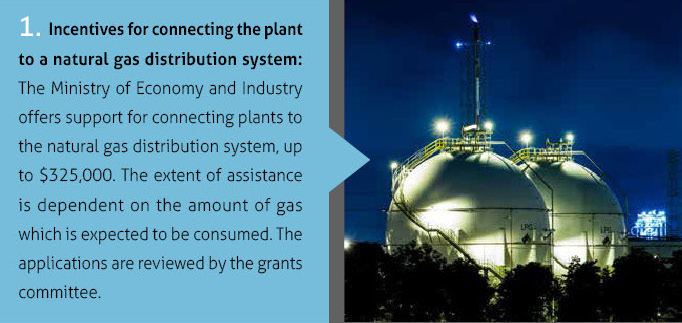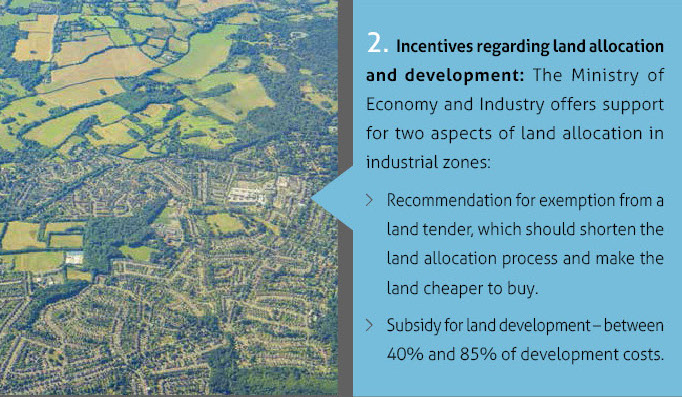3. Employment grants:
3. Employment grants:
The Ministry of Economy and Industry operates several aid programs intended to encourage the integration of workers from minority populations, populations with low labor participation rates and populations from National Priority Areas. The aid is given by the Israel Investment Center in the form of subsidizing the wages of new employees for a specific time period. The employment programs include:
Special Populations:
Facilitate integration of populations with low rates of labor force participation, through wage subsidies.
-
• Eligible company must hire employees from special populations. The special population could be characterized either by their social identity (Ultra-Orthodox, ethnic minorities [e.g. Israeli Arabs or Bedouins], individuals with disabilities, single parents) or by their place of residency (NPAs). For the former group of special populations, it is not obligatory to reside in an NPA. However, the rate of subsidy could be higher if they do reside in one.
- In addition, the applying person must absorb a minimum number of new employees from special populations (2 to 5 employees, depending on the specific program), and also compensate the employees a minimum level specified by the program.
- Form of aid: A grant for at least 30 months given in the following format:
- Subsidy as a percentage of employee wages, by group, up to a maximum monthly wage of NIS 24,000 (approx. $6000).
- The rate of subsidy varies between 10% and 37.5%. The rate is determined by the social identity of the employees and their geographic location, with preference to a combination of the two.
- • The rate of subsidy decreases over the period.
Support for high-quality employment in National Priority Areas:
Facilitate the integration of highly skilled employees exclusively in manufacturing and IT enterprises located in National Priority Regions.
Eligibility:
Companies interested in establishing, expanding, or relocating high-salary facilities to NPAs. The eligible company must be registered as an Israeli corporate entity, with annual turnover of NIS 25 million (approx. $6 million) or more. At least 60% of the new employees in the facility will be residents of the NPA. The companies must hire a minimal number of 15 new employees and should pay a determined wage level (not below 1.5 to 2.5 times the national average salary, depending on the specific program).
Benefits:
Based on specific sub-track, grants for each employee will be based on the percentage of his or her wage. The grant’s percentage decreases over a 4-year period:
• “High-Salary” sub-track:
- At least 15 new employees.
- Grant rate decreases from 35% to 10% of the employee’s salary.
- The monthly salary will be up to maximum of NIS 30,000 (approx. $7,500).
Minorities’ internship in knowledge-based industries:
Facilitate integration of ethnic minorities into knowledge-based sectors, specifically: students, interns, and graduates from knowledge-based educational backgrounds (Chemistry, Physics, Computers, Engineering, etc.).
Eligibility:
An employer recruits at least one new employee from the specified minority population. In addition, the recruited employee’s wage should be at least NIS 30 (approx. $7.5) per hour for a minimum of 60 hours per month, for a period of at least 12 months and no longer than 24 months.
Benefits:
Grants for each employee are calculated as a percentage of his or her wages. The grant rate decreases over a period of 2 years from 30% to 40% of the wage. The monthly wage will be up to NIS 13,000 (approx. $4,250).
Training incentives:
-
“On the Job Training” program - The Ministry of Economy and Industry offers support for training courses by an instructor that is selected by the factory:
- Participation in employees’ wages: Up to NIS 2,000 per employee for the period of the training.
- Participation in the instructors’ wages: Up to NIS 3,000 per employee for the period of the training.
- Length of the supported training is one to six months.
- The plant must commit to employ the trained employee upon completion of the course.
-
“Class in factory” program – The Ministry of Economy and Industry offers a full subsidy for a manufacturing plant that hosts a certification program in an industrial vocation for the unemployed. The plant commits to employ most of the students.


